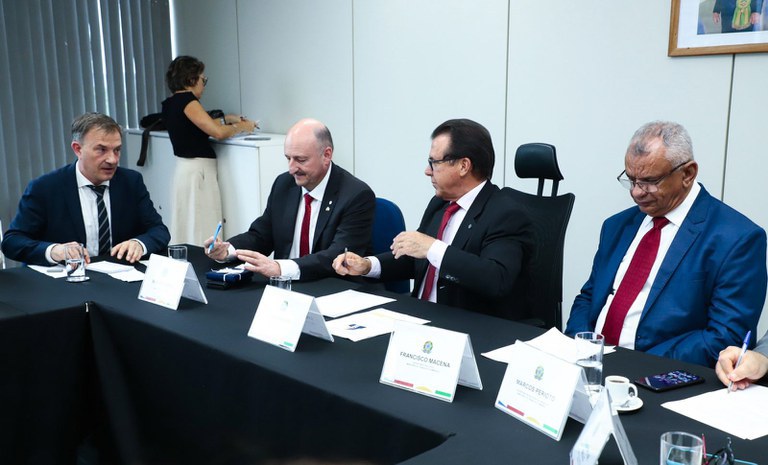Notícias
G20
Federal Government and German Parliament debate public policies on employment and income

Foto: Matheus Damascena/MTE
The Minister of Labor and Employment, Luiz Marinho received, on Monday (4), the German Parliament’s members of the Labor and Social Affairs Committee to exchange information about the world of work. On the agenda, the topics highlighted were the G20, the regulation of platform work, minimum wage, public employment policies and informality.
During the meeting, Luiz Marinho pointed out that Brazil and Germany have always had a very close relationship both in the past and in the current governments of President Lula. According to the minister Brazil is addressing issues nationally as well as globally through the G20.
"Our challenge is to think about climate change, the new energy matrices and their transition, as well as the preservation of humanity. But it is necessary to think about how to contribute to the debate of ending global hunger. President Lula has said that there is no lack of wealth, neither in Brazil nor in the world, but what is missing is a better distribution of these resources", said the Minister. To him, there is a need to advance in the debate on the protection of the world of work in order to have a better distribution of income and ensure equality between men and women.
The President of the Commission, Deputy Bernd Rützel, informed that Brazil is very important and decisive today, and it is a great satisfaction to know more about its public policies.
Brazil's Growth
According to Luiz Marinho, this is a time of great opportunities and investments in which Germany and Brazil can act together, with the encouragement of German companies to invest in our country. "This is a time for investment in new energy matrices and climate solutions, the so-called green and blue investments, investments in infrastructure and expansion of the economy. We want to take Brazil back to the 7th global economy," he said.
Labor Legislation
“Between 2016 and 2022, a period in which we were out of government,” Marinho explained, “Brazil suffered a setback in labor relations and labor legislation, which pushed many workers into informality.”
Luiz Marinho pointed out that the current government has been repairing issues about labor relations and labor legislation since last year, an example of which is the Bill for app drivers who transport people, which guarantees at least a minimum wage and compensation for the costs of their activity. "This law creates a special category for these workers and was built in a tripartite way for a year," he explained.
For Bernd Rützel, many issues do not resolve themselves, and a law is needed to regulate. He also pointed out that a similar debate is taking place in Europe for the creation of similar legislation. "It is important to work on this agenda at the G20 because it is something that everyone will need. Platforms are a new form of employment that needs regulation," added the deputy.
Minimum Wage and Informality
Another point addressed, this time, by Deputy Matthias Borkwald was how Brazil has faced the informality of the labor market and how the policy for the correction of the minimum wage works. Marinho said that since last year the government has been striving to recover formal jobs and organize the economy. "This is already
starting to pay off, in 2023 we created 1.5 million formal jobs. The economy is also growing. Experts in the field were betting that the country would grow 0.7% last year, but we grew 2.9%," he argued.
Regarding the correction of the minimum wage, the minister said that the method applied in the first Lula government was resumed. The calculation consists of replacing inflation plus the real growth of the economy. "This year the minimum wage increased to R$ 1,412.00 on January 1st. If this calculation had not been interrupted, it would have been R$ 1,492.00," he said.
The minister also mentioned the correction of the income tax table this year, so those who receive up to R$ 2,824.00 are exempt from the tax, which is also important for increasing the purchasing power of those who earn less. "These policies aim to produce the same effects as the previous governments of Lula and Dilma, which is to expand the Brazilian consumer market, causing the growth of the economy and the generation of quality jobs in Brazil, as it was in the past," Marinho explained.
Professional Qualification
Regarding the challenges of the world of work, Luiz Marinho stressed that there is a permanent need for updating and training of workers, Brazil has strongly expanded its network of education institutes focused on technical training, qualifying for digital and technological areas. "Brazil has the new growth PAC with a forecast of investments in the order of R$ 1.7 trillion, in four years, in infrastructure and new investments in technology. All of this is being monitored by the government, which seeks to involve workers and entrepreneurs," he said.
Also present on behalf of the MTE were the executive secretary, Francisco Macena; the Secretary of Labor Relations, Marcos Perioto; the Secretary of Labor Inspection, Luiz Felipe Brandão de Mello; the Chief of Staff, Lene Teixeira, and Maíra Lacerda from the International Advisory.
The meeting was attended by deputies Matthias Birkwald, Martin Rosemann, Marc Biadacz, Max Straubinger, Beate Müller-Gemmeke, Anja Schulz and Gerrit Huy, as well as the accompanying representatives of the German ambassador Bettina Cadenbach, the commission's advisor Astrid Mahler-Neumann, the advisor Rainald Baier and the Social Attaché Manfred Brinkmann, both from the Brazilian embassy.